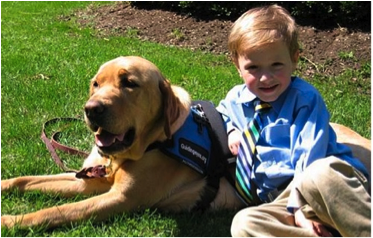In a new report, parents of children with autism describe a broad range of benefits associated with having a specially trained service dog. They feel their child is safer – particularly in terms of curbing the tendency to bolt or wander. They also describe how having a service dog both calms their child and draws a more understanding response from strangers in public situations. The report appears in full on BMJ Open, the open-access journal of the British Medical Association. In the study, researchers with Ireland’s University College Cork asked more than 200 parents of children with autism to use a 7-point scale to rate issues such danger of bolting, child anxiety, acceptance in public situations and caregiver strain and confidence. They also asked about actual or anticipated challenges around having a service dog for their child. They then compared the answers of 134 families whose child had a service dog and 87 that were on a waiting list for one. As a group, parents whose child had a service dog reported being significantly less fearful for their child’s safety, especially around bolting and wandering. “Assistance dogs complete a unique triad between parent/guardian and child,” the study authors write. “Typically, the child is attached to the dog via a lead (leash) and belt. The dog walks with the child but takes commands from the parent (handler). If the child tries to step off a footpath or attempts to bolt, the dog will use all his/her power to slow the child down.” This, combined with greater calmness in the child and greater acceptance in public, was also associated with reports of significantly greater family freedom among the families with a service dog. “Assistance dogs can provide a unique support by facilitating child safety and promoting positive public reception,” the authors note. “Outings to public places can become less stressful and families can enjoy greater freedom and mobility.” The parents also reported that having a dog required a considerable amount of dedication and commitment on their part. Autism Speaks staff member Michele Arbogast concurs with the study’s many findings. “I think it’s quite difficult for a study to even touch the profound effects an autism service dog can have on a family,” she says from experience. “From the very first moment my son walked through a store with his dog Taz, you could see and feel his joy and sense of freedom. No words were necessary. No longer did mom have a death-grip on him. Ever since, Taz and Kyle have been on planes, trains, in subways and in cars together. They have been on boats out on the ocean and on rides at amusement parks. Taz also brings comfort to Kyle’s twin sister and older brother. He really is a slice of heaven.” Arbogast likewise concurs with the surveyed parents about the significant commitment involved in having an autism service dog. “Taz is a member of our family,” she says, “and requires training, good nutrition, exercise, down-time and endless love.” https://www.autismspeaks.org/science/science-news/parents-report-service-dogs-keep-kids-autism-safer-and-calmer







